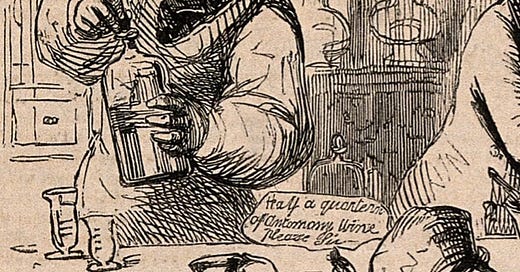The sleuthing pub landlord
In inner city Birmingham, one man combined a job running a pub with another investigating local people...
William Manton was a former chief inspector for the Birmingham City police force. When he retired, he became a private detective - but his new career only lasted a year. This was relatively unusual; although private detection was a precarious career for many, those who came to it after long careers in the police were far more likely to succeed. After he failed in this job, he became, perhaps unexpectedly, a pub landlord.
Manton was born in Aston, now inner-city Birmingham, on 27 June 1813, the son of whitesmith John Manton and his wife Margaret. By the age of 28, he was a police officer working and living in the market town of Pershore, Worcestershire. In April 1841, he married Jane Hughes. The births of their children show their moves across Worcestershire and back to Birmingham: eldest child John Robinson Manton - the only of their children to reach adulthood - was born in Pershore in 1842. Emma (possibly a mis-recording by a registrar of Esther) was born in Pershore in 1844; Harry was born in Bromsgrove in 1849, and died there the following year; and in 1851, William Harry was born back in Aston, where he died at a year old.
In Aston, the Mantons settled at Adelaide Street. Jane Manton's mother Esther, and one of her sisters - also named Esther - moved in with them. By 1861, William had been promoted to inspector, and was regularly featured in the press in relation to his work. In 1871, Manton was further promoted to chief inspector, but within a few months, he had suddenly left the police, for reasons unknown. He then became a pub landlord, taking on The Beehive Hotel in Handsworth (meeting with a serious accident there at one point, when. he fell down the stairs of an outhouse, both breaking an arm and dislocating his hip). Yet at around the same time, he also started a private detection business.
A 19th century public house, from the Wellcome Collection (public domain)
He advertised in the local papers as operating an office at 5 Union Street, in Birmingham's city centre. As was common with other former policemen who became private detectives, he marketed himself based on his previous experience: 'William Manton, late Chief Inspector of Detectives, Birmingham', and added a bit of hyperbole, claiming to have detective agents 'in all large towns', when he was actually a one-man band.
Former police detectives had a higher chance of making it as private detectives than those who came from other fields, although of course, this is something of a generalisation. However, I've found that most of the private detectives with longevity - longer careers in this area - were former police detectives. They had the skills and contacts to make it as successful private eyes. William Manton, however, was not one of these men. He only advertised in the press over the course of about a year, and stopped in 1875, despite now claiming to have agents not only in the UK, but also in New York, Philadelphia and Chicago. His final advert was placed in May 1875, eleven months after his first.
From then on, William Manton stuck to a single job: that of pub landlord. He moved to the Star Hotel, at the southernmost part of the Jewellery Quarter and next door to St Paul’s Club, a private members’ club (which still exists, albeit in a different building in Birmingham now). He continued selling beer until his death in July 1882.





I love that cartoon- the Wellcome Collection is a joy. Thanks for the article Nell. Always interesting.